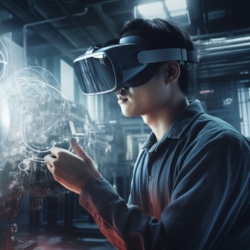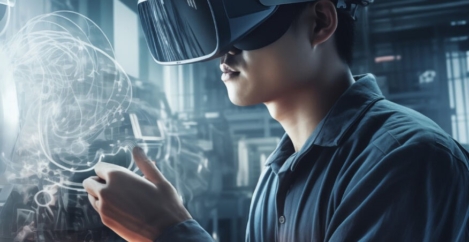December 5, 2023
People are worried about the impact of new tech, but many feel confident it will benefit them
 With over a third (36 percent) of workers concerned about the impact of technological changes and what this might mean for them, a new report from Virgin Media O2 Business claims that many people believe new tech will offer them a better work-life balance. According to the report, the pandemic accelerated remote and hybrid work, mostly benefitting desk-based workers. Meanwhile, deskless workers like teachers, nurses and engineers saw limited long-term change despite many organisations comprising both types of workers.
With over a third (36 percent) of workers concerned about the impact of technological changes and what this might mean for them, a new report from Virgin Media O2 Business claims that many people believe new tech will offer them a better work-life balance. According to the report, the pandemic accelerated remote and hybrid work, mostly benefitting desk-based workers. Meanwhile, deskless workers like teachers, nurses and engineers saw limited long-term change despite many organisations comprising both types of workers.
Virgin Media O2 Business polled 2,000 UK workers across sectors and found that over a quarter (27 percent) of deskless workers feel they can’t keep up with the pace of technological change and believe this should be addressed. This rises to 41 percent for deskless transport/storage workers, while almost one in three (31 percent) deskless workers feel concerned by the loss of control in their roles to automation and AI.
The report’s authors say that these apprehensions highlight the importance for businesses to ensure conversations about the future involve both desk-based and deskless workers.
The research suggests that many workers struggle to picture the future of their industries and roles. Half of respondents aged under 50 do not know what job they will be doing in 20 years based on how quickly their industry is changing, rising to two-thirds (66 percent) for deskless retail workers and almost two-thirds (63 percent) for transport/storage workers.
Over half (53 percent) of deskless workers feel that senior management could help enhance communication by providing clearer explanations on significant technology shifts. This rises to 59 percent for manufacturing deskless workers and 57 percent for retail deskless workers.
However, many workers remain optimistic about the role of emerging technology in the future of work. Nearly half (46 percent) of deskless workers agree that technology will play a key role in the future of work, over a third (36 percent) are excited by the possibilities, and 32 percent believe they would be more productive if their company adopted more emerging technologies.
Over half (56 percent) of deskless workers think employees who improve their knowledge of emerging technologies will gain a significant advantage over their peers in the job market, while a third (33 percent) believe emerging technologies could offer them a better work-life balance.
Based on the research findings, professional futurist Tracey Follows, believes that whilst many traditional job roles will evolve, just as many new augmented roles and novel sectors will emerge.
Follows predicts that:
By 2040, most traditional salaries will no longer exist: Traditional paid salaries will be replaced by, or supplemented with, more innovative payment models moving beyond fiat currency (a government-issued currency) – dependent on blockchain and/or decentralised finance maturing into a mainstream capability. Employees will be able to choose how they are paid driven by their own politics and ethics.
Within 20 years deskless workers will have intelligent uniforms: Connected clothing will become built into uniforms for front-line workers, meaning materials can respond to environmental conditions, for example, temperature, air quality, or even noise.
Within 10 years, 10 percent of deskless industrial roles will be part of the safety sector: Increasing global focus on worker safety and regulatory compliance will drive demand for safety professionals. As automation increases, so will the need for safe human-machine interaction and brand-new roles will be created in these areas.















